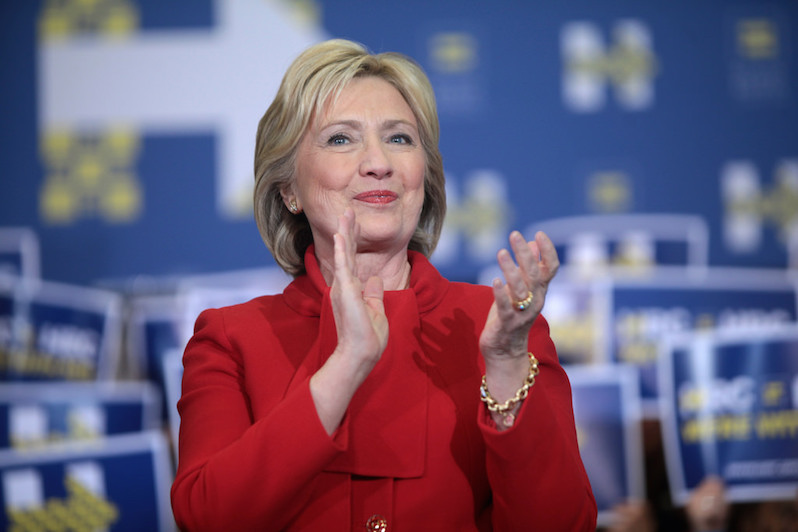Why Hillary Clinton Republicans Matter
The Democratic nominee is making an appeal to GOP members opposed to Donald Trump. Her unspoken message: The stakes for the party's dissenters are too high for halfway measures and bet hedging. Hillary Clinton is making an appeal to Republicans who are opposed to Donald Trump. (Gage Skidmore / CC BY-SA 2.0)
Hillary Clinton is making an appeal to Republicans who are opposed to Donald Trump. (Gage Skidmore / CC BY-SA 2.0)
Hillary Clinton is making an appeal to Republicans who are opposed to Donald Trump. (Gage Skidmore / CC BY-SA 2.0)
Not since Barry Goldwater’s 1964 campaign has there been such widespread public disavowal by Republicans of their party’s nominee. The Hillary Clinton Republicans will be one of the most important legacies of the 2016 campaigns.
The question is whether they will constitute the forward end of a political realignment, or just a one-time reaction to the unsuitability of Donald Trump for the presidency.
Reasons for skepticism about long-term change are rooted in the differences between today’s polarized politics and the more tempered partisanship surrounding the big-bang elections of 1964 and 1980.
In 1964, there was a lively liberal wing of the Republican Party. GOP figures such as Jacob Javits, Clifford Case, Edward Brooke and John Lindsay had far more in common philosophically with Lyndon Johnson than they did with Goldwater.
Thus, 1964 was genuinely realigning, setting off the flight of conservative white Southerners from the Democratic Party but also a defection of liberals from the Republican Party. Many (including Lindsay, Javits and Case) were pushed aside in primaries.
The celebrated Reagan Democrats of 1980, in the meantime, came in several varieties. Many were the same white Southerners who began voting Republican in 1964 but didn’t abandon their old party label. Others were Northern working-class whites who started voting Republican in Richard Nixon’s 1968 and 1972 elections. And some were neoconservatives who disliked President Jimmy Carter’s foreign policy. Here again, there was philosophical coherence.
The Never Trump Republicans, including those who have endorsed Clinton, are a far more complicated group. Many of them are devout philosophical conservatives who have little in common with Clinton on either policy or ideology. They see Trump as unacceptable largely because of who he is: his tendency toward cruelty and viciousness, his racial attitudes and his lack of seriousness about policy. Many Republicans are praying the Trump episode will be an interlude and that they will be able to resume control of their party after it ends.
Others are a part of an unusual alliance between hawkish neoconservatives and Republican foreign policy realists who often disagree with each other but are joined in the view that Trump’s foreign policy, such as it is, is entirely outside the internationalist traditions their party has broadly upheld since World War II. Both ends of this anti-Trump alliance are especially suspicious of his friendly views of Vladimir Putin and his support of policies (on NATO and the European Union) that would advance Russia’s interests.
On foreign policy, there is some coming together between Clinton and her Republican allies. Dovish liberals worry about this aspect of the anti-Trump right. They suspect — partly on the basis of her history — that Clinton’s instincts are more hawkish than President Obama’s.
Her allies on international issues cast the issue somewhat differently — and more positively: that Clinton’s election could restore something close to an older consensus on foreign policy that was blown apart by the Iraq War. They argue that she occupies a middle ground between Obama and his hawkish critics. She is less interventionist than the neoconservatives but would, on some issues, be tougher in her approach to diplomacy than Obama has been.
Any long-term electoral effect of the rise of Clinton Republicans is likely to be felt among the white college-educated whom Trump has so alienated. Trump’s turn to the hard right, reinforced by his hiring of Breitbart’s Steve Bannon as his campaign CEO, could further aggravate the GOP’s problem with such voters. Trump muddled his position on immigration to try to win some of them back.
Clinton’s hope if she wins is that the existence of Clinton Republicans will make her relations with the GOP in Congress easier. Especially if Democrats take the Senate, Republicans in the House — even if they keep their majority — might give her some room to win legislative victories, particularly on immigration reform and large-scale infrastructure investment. On the other hand, GOP politicians who opposed Trump or were lukewarm about him might seek to restore their bona fides with Trump’s constituency by being especially ferocious in their opposition to Clinton.
All this, however, is premised on a Clinton victory. If the race tightens, Republicans who know that Trump should not be president will have to be less grudging about lending their full support to Clinton. She tried to encourage them last week by declaring that Trump’s extremism represented neither “conservatism as we have known it” or “Republicanism as we have known it.” Her unspoken message: The stakes for the party’s dissenters are too high for halfway measures and bet hedging.
Your support matters…Independent journalism is under threat and overshadowed by heavily funded mainstream media.
You can help level the playing field. Become a member.
Your tax-deductible contribution keeps us digging beneath the headlines to give you thought-provoking, investigative reporting and analysis that unearths what's really happening- without compromise.
Give today to support our courageous, independent journalists.









You need to be a supporter to comment.
There are currently no responses to this article.
Be the first to respond.